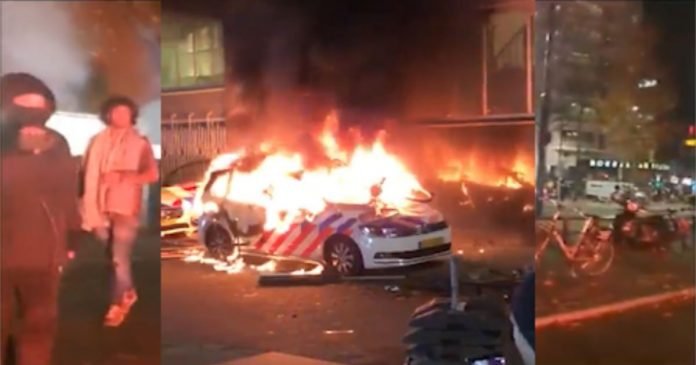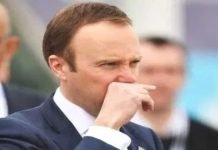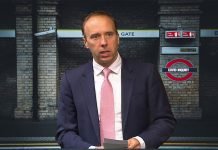Crowds of protesters in the port city of Rotterdam torched cars and threw rocks at police who responded with shots and water cannon, as protests against COVID-19 measures turned violent on Friday night.
Police said they fired warning shots in Rotterdam, injuring some people, as protesters gather to contest new restrictions to curb the spread of COVID-19.
Rotterdam’s police said there were “injuries related to the fired shots” but did not specify how many people were injured and whether anyone was seriously hurt.
The demonstration started around 8:00pm and “resulted in riots,” police said in a statement.
“Fires have been set in several places. Fireworks were set off and police fired several warning shots. The riot police is presently present to restore order,” they added.
COVID-19 cases have reportedly soared recently in the Netherlands, with more than 20,000 daily cases reported — an all-time high since the beginning of the pandemic.
The government implemented a partial lockdown on November 13 that is due to run for at least three weeks as they weigh stricter restrictions on the unvaccinated.
Several hundred people had gathered to voice opposition to government plans to restrict access to indoor venues to people who have a “corona pass”, showing they have been vaccinated or have already recovered from an infection.
The pass is also available to people who have not been vaccinated, but have proof of a negative test.
Police issued an emergency ordinance in Rotterdam, shutting down public transportation and ordering people to go home. Water canons were deployed and police on horseback carried out charges to disperse the crowds, police said.
The authorities also called on bystanders and people who recorded images of the riots to send the footage to police for further investigation.
The Netherlands re-imposed some lockdown measures last weekend for an initial three weeks in an effort to slow a resurgence of coronavirus contagion, but daily infections have remained at their highest levels since the start of the pandemic. read more
Video posted on social media showed the moment a man was shot along with burnt out police cars.
Meanwhile in Austria locks down as Germany moves to restrict unvaccinated.
Countries in the EU are attempting to curb the spike through various means, from introducing lockdowns for the unvaccinated to limiting access to certain services or pushing for an increase in vaccination rates.
Around 60% of people in Western Europe are fully immunised against COVID-19, but only about half as many are vaccinated in Eastern Europe.
The World Health Organization reported on Tuesday (November 16) that coronavirus deaths in Europe rose 5% in the previous week, making it the only region in the world where COVID-19 deaths increased.
Austria is to impose a general lockdown from Monday (November 22), becoming the first EU country to take such a measure in the face of the COVID-19 resurgence.
Conservative Chancellor Alexander Schallenberg has also said that vaccination will become compulsory from February 1.
The announcement comes a few days after the country implemented a nationwide lockdown for people who are unvaccinated, which came into force last Monday (November 15).
People 12 years and older are banned from going outside except for essential activities such as work, attending classes, grocery shopping, or for a walk. The number of police patrols has been increased and those found breaking the rules can be fined up to €1,450.
“In the long term, the way out of this vicious circle we are in — and it is a vicious circle, we are stumbling from wave to lockdown, and that can’t carry on ad infinitum — is only vaccination,” Schallenberg said earlier this week.
According to the European Centre for Disease Prevention and Control (ECDC), just over 64% of the population was fully vaccinated by November 19, slightly below the EU average (65.5%). Coronavirus cases have continued to rise, hitting a daily total of 15,000 on Thursday.
Authorities in Austria said on November 17 that travellers would need to show a negative PCR test upon entering the country. Previously, results from the cheaper lateral flow tests were allowed.
Germany
Germany will introduce tighter COVID-19 restrictions on unvaccinated citizens, Chancellor Angela Merkel said on Thursday (November 18).
In most regions, only the vaccinated and those who have recovered from the virus will be able to access public places such as restaurants or concert halls.
The country’s lower house of parliament the Bundestag voted on Thursday in favour of new restrictions to curb a surge in coronavirus cases. The plans include new restrictions for the workplace and public transport.
The measures were proposed by the three parties expected to form the next coalition: the Social Democrats (SPD), the liberals and the greens.
With the new enforcement will come more protests with what looks like both sides willing to use violence this could soon get out of hand.
Support Independent Journalism Today
Our unwavering dedication is to provide you with unbiased news, diverse perspectives, and insightful opinions. We're on a mission to ensure that those in positions of power are held accountable for their actions, but we can't do it alone. Labour Heartlands is primarily funded by me, Paul Knaggs, and by the generous contributions of readers like you. Your donations keep us going and help us uphold the principles of independent journalism. Join us in our quest for truth, transparency, and accountability – donate today and be a part of our mission!
Like everyone else, we're facing challenges, and we need your help to stay online and continue providing crucial journalism. Every contribution, no matter how small, goes a long way in helping us thrive. By becoming one of our donors, you become a vital part of our mission to uncover the truth and uphold the values of democracy.
While we maintain our independence from political affiliations, we stand united against corruption, injustice, and the erosion of free speech, truth, and democracy. We believe in the power of accurate information in a democracy, and we consider facts non-negotiable.
Your support, no matter the amount, can make a significant impact. Together, we can make a difference and continue our journey toward a more informed and just society.
Thank you for supporting Labour Heartlands












